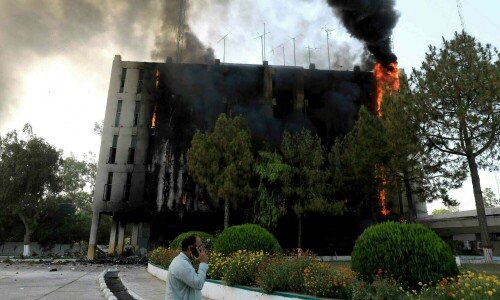WASHINGTON: The Trump administration’s budget cuts may lead to disbanding of the office of the US Special Representative for Pakistan and Afghanistan, a key diplomatic position devoted to restoring peace to the region, according to diplomatic sources.
The sources, who spoke to Dawn and US media outlets, said an unprecedented 28 per cent cut in the State Department’s budget would mainly affect the foreign assistance that the department provides to US allies. But the cut, proposed in the Trump administration’s 2018-19 budget, would also force the State Department to cut down its size.
Publications that specialise in posting, transfers and sackings in the US government reported that President Donald Trump and his aides were reviewing whether to eliminate many special envoy positions. The proposal, if approved, will affect the “diplomatic staff assigned to key regions and issues, including climate change, anti-Semitism and Muslim communities”.
The Chicago Tribune, while reporting on how the budget cut announced last week, would affect the State Department, noted that although the Trump administration had completed its second month in office, “many key national security and foreign policy positions still remain vacant”.
Vacancies at the State Department include both key positions that deal directly with the greater South Asian region, US special representative for Afghanistan and Pakistan and the Assistant Secretary of State for South and Central Asia.
The last assistant secretary, Nisha Biswal, was let go soon after the new administration took charge. The last special representative was Richard Olson, who served from Nov 17, 2015, to Nov 17 of last year. He was replaced by an acting representative, Laurel Miller.
The State Department defines the special representative’s role as that of coordination “across the government to meet US strategic goals in the region while engaging Nato and other key friends, allies, and others to support these efforts”.
Dan Feldman, who served in the special representative’s office since its creation in 2009 and also as its head from 2014 to 2015, argues that the office was created to combine diplomacy with the US military offensive to restore peace in Afghanistan.
“Any long-term Afghanistan resolution requires integrated and comprehensive military and diplomatic leadership from the United States,” he said in a piece he wrote for The Chicago Tribune.
“And if that was the case when international forces were at their apex in Afghanistan several years ago, with close to 150,000 foreign troops on the ground, that’s even more the case now, with 13,000 international troops remaining,” he added.
Mr Feldman wrote that “the only feasible, sustainable, cost-effective, long-term resolution for Afghanistan is a negotiated political settlement between all parties, including the Taliban”.
And this will “unequivocally require sustained US diplomatic leadership to achieve. In the interim, continued US diplomatic leadership, as an equal counterpart to military leadership,” said the former US diplomat while explaining why he believed the Trump administration needed to continue the office of the US Special Representative for Afghanistan and Pakistan (SRAP).
The special representative also engages with the key nations of the region, which will need to support any long-term resolution. “Doing all this effectively requires not just diplomacy, but an empowered, credible, experienced US diplomat,” Mr Feldman wrote.
But reports in other US media outlets say that such arguments are not having much impact on the Trump administration, which is determined to reduce the size of the State Department. Trump advisers believe that the job assigned to SRAP could also be done by a section within the office of the Assistant Secretary of State for South Asia.
But there are also proposals to combine the offices of the assistant secretaries for South, Central and East Asia. If such proposals are accepted, the new assistant secretary will be required to look after an area that will stretch from the borders of Russia to Japan. This will not only cover three huge nations — China, India and Indonesia — but also close US allies like Japan and South Korea.
The combined office of South, Central and East Asia will also include two major crisis zones, the Korean peninsula and the Pak-Afghan region. That’s why think-tank and media experts say that this merger may not happen, although merging the SRAP’s office in the South and Central Asian bureau is more likely.
Published in Dawn, March 20th, 2017















































